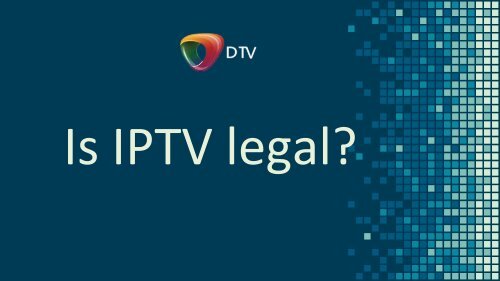What is IPTV | The Future of IPTV
Internet Protocol Television (IPTV) is the process of transmitting and broadcasting television programs via Internet Protocol (IP). It provides a simple method for watching popular TV shows, but unlike downloaded media, it offers the option to stream the source media continuously. The first mention of “IPTV” was in 1995 but the term has become increasingly popular over the last 5 years. You may be wondering why IPTV is different from other broadcasting methods, but to fully understand its capability, it’s important to look at the more “traditional” methods of broadcasting. With satellite TV, broadcasters send out signals and viewers receive these signals, so you’re only able to watch TV shows that are being broadcasted. So you tune in and see what shows, documentaries, films or sports events are available to watch. IPTV is completely different. Rather than transmitting media content via these “signals” in fiber-optic cables, IPTV broadcasts shows through your standard internet connection. With IPTV, programs are not broadcast on a specific schedule (as is the case with satellite TV), and plans can include video on demand (VOD) much like Netflix and Amazon Prime, whereby there’s no time limit on the content you can watch. IPTV can also incorporate time-shifted media, and this is where the content shared has a shelf-life, as is the case with BBC’s iPlayer. As you can see, it’s easy for the lines to get a little blurry, but in its most basic definition IPTV is television programming that is being communicated using the internet protocol, and it can include these three types of broadcasting: Video on demand (VOD) Time-shifted media Live IPTV or IP simulcasting – broadcasting live programs across the Internet as they’re being watched
Internet Protocol Television (IPTV) is the process of transmitting and broadcasting television programs via Internet Protocol (IP). It provides a simple method for watching popular TV shows, but unlike downloaded media, it offers the option to stream the source media continuously.
The first mention of “IPTV” was in 1995 but the term has become increasingly popular over the last 5 years. You may be wondering why IPTV is different from other broadcasting methods, but to fully understand its capability, it’s important to look at the more “traditional” methods of broadcasting. With satellite TV, broadcasters send out signals and viewers receive these signals, so you’re only able to watch TV shows that are being broadcasted. So you tune in and see what shows, documentaries, films or sports events are available to watch.
IPTV is completely different. Rather than transmitting media content via these “signals” in fiber-optic cables, IPTV broadcasts shows through your standard internet connection.
With IPTV, programs are not broadcast on a specific schedule (as is the case with satellite TV), and plans can include video on demand (VOD) much like Netflix and Amazon Prime, whereby there’s no time limit on the content you can watch. IPTV can also incorporate time-shifted media, and this is where the content shared has a shelf-life, as is the case with BBC’s iPlayer. As you can see, it’s easy for the lines to get a little blurry, but in its most basic definition IPTV is television programming that is being communicated using the internet protocol, and it can include these three types of broadcasting:
Video on demand (VOD)
Time-shifted media
Live IPTV or IP simulcasting – broadcasting live programs across the Internet as they’re being watched
- No tags were found...
Create successful ePaper yourself
Turn your PDF publications into a flip-book with our unique Google optimized e-Paper software.
Is <strong>IPTV</strong> legal?
<strong>IPTV</strong>?<br />
Internet Protocol Telev<strong>is</strong>ion<br />
(<strong>IPTV</strong>) <strong>is</strong> the process <strong>of</strong><br />
transmitting and<br />
broadcasting telev<strong>is</strong>ion<br />
programs via Internet<br />
Protocol (IP).<br />
2
<strong>What</strong> they DO?<br />
▪<br />
It provides a simple<br />
method for watching<br />
popular TV shows, but<br />
unlike downloaded<br />
media, it <strong>of</strong>fers the<br />
option to stream the<br />
source media<br />
continuously.<br />
<strong>IPTV</strong> <strong>is</strong> completely different.<br />
Rather than transmitting media<br />
content via these “signals” in<br />
fiber-optic cables, <strong>IPTV</strong><br />
broadcasts shows through your<br />
standard internet connection.<br />
3
▪<br />
▪<br />
▪<br />
Video on demand (VOD)<br />
Time-shifted media<br />
Live <strong>IPTV</strong> or IP simulcasting – broadcasting live<br />
programs across the Internet as they’re being<br />
watched<br />
4
If I use <strong>IPTV</strong>, am I<br />
breaking the law?
NO, <strong>IPTV</strong> <strong>is</strong> technically legal.<br />
As long as <strong>IPTV</strong> service<br />
providers are not storing<br />
the content and<br />
red<strong>is</strong>tributing or selling it,<br />
then strictly speaking they<br />
aren’t doing anything<br />
illegal<br />
6
7<br />
<strong>The</strong> <strong>Future</strong> <strong>of</strong> <strong>IPTV</strong>
A PICTURE IS<br />
WORTH A<br />
THOUSAND WORDS<br />
8
THANKS!<br />
<strong>The</strong> original article publ<strong>is</strong>hed on<br />
<strong>IPTV</strong> Legalization



